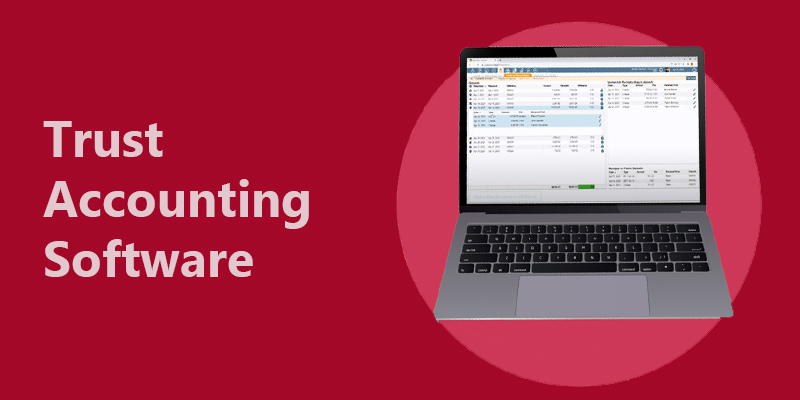Contents
Introduction
In the dynamic and detail-oriented world of legal practice, trust accounting for lawyers stands as a cornerstone of ethical and professional responsibility. This comprehensive guide aims to delve into the intricacies of trust accounting, highlighting its critical role in maintaining the integrity and trustworthiness of law firms towards their clients. Trust accounting, by its nature, involves the management of client funds that are temporarily held by attorneys, making it a pivotal aspect of legal operations that requires meticulous attention and adherence to regulatory standards. As we navigate through the essentials of trust accounting, we’ll uncover its significance, the procedures for setting up trust accounts, best practices in managing these Trust Funds, common pitfalls to avoid, and the impact of technology in streamlining trust account management. With trust accounting software evolving as an indispensable tool, law firms are better equipped to uphold their fiduciary duties while enhancing operational efficiency. Let’s embark on this journey to ensure your practice is not only compliant but also exemplifies the highest standards of client service and ethical practice.
Setting Up Trust Accounts
Establishing a trust account is a foundational step for any law firm, ensuring that client funds are handled with the highest level of integrity and compliance. There are two primary types of trust accounts that lawyers need to be familiar with: pooled trust accounts and separate trust accounts.
Pooled trust accounts aggregate funds from multiple clients into a single account. This approach can simplify the management of smaller amounts or when transactions are frequent but requires meticulous record-keeping to accurately track each client’s balance. Separate trust accounts, on the other hand, are established for individual clients, offering a clear, straightforward management of larger sums or when funds are held for extended periods.
The steps for setting up a trust account begin with a clear understanding of your jurisdiction’s legal requirements, which can vary significantly. Key considerations include choosing a compliant financial institution familiar with the legal sector’s needs and ensuring that the account is correctly titled to reflect its purpose as a trust. Compliance with the Interest on Lawyers Trust Accounts (IOLTA) program, where applicable, is also crucial.
- Identify the Type of Trust Account Needed: Decide between a pooled or separate account based on the nature of your practice and the specific needs of your clients.
- Select a Compliant Bank: Legal Ethics are essential. Be sure to choose a financial institution experienced in handling lawyer trust accounts and familiar with the legal requirements of IOLTA accounts, if relevant.
- Understand the Regulations: Familiarize yourself with both state and federal regulations governing trust accounts to ensure full compliance. This includes any specific record-keeping mandates, reporting requirements, and audit protocols.
- Set Up the Account Properly: Work with your bank to ensure the account is correctly set up. This includes proper titling of the account as a trust or IOLTA, depending on the funds it will hold and the purpose it serves.
- Implement Rigorous Accounting Practices: From the outset, establish strict accounting procedures for managing the trust account, including detailed tracking of all deposits and withdrawals, regular reconciliation, and clear client communication.
Adhering to these steps not only ensures compliance with legal regulations but also builds trust with your clients, demonstrating your firm’s commitment to ethical practice and financial responsibility. As trust accounts are subject to rigorous scrutiny and carry significant ethical implications, understanding the nuances of setting them up and managing them effectively is paramount for any law firm aiming to uphold the highest standards of legal practice.
Managing Client Funds: Best Practices
The management of client funds within a law firm demands precision, transparency, and unwavering ethical standards. Adhering to best practices in this area not only ensures compliance with legal and ethical guidelines but also fortifies the trust between a lawyer and their clients. Here are key practices for managing client funds effectively:
- Absolute Separation of Funds: Perhaps the most fundamental rule in trust accounting is never to mix client funds with the firm’s operating funds. Each penny of client money should be deposited into the trust account and must only be used for its intended purpose. This separation safeguards client interests and prevents any potential misuse of funds.
- Meticulous Record-Keeping: Detailed and accurate record-keeping is essential for tracking every transaction related to a trust account, including deposits, withdrawals, and transfers. Each entry should include the date, amount, source or recipient, and purpose. These records serve as a critical audit trail that can verify compliance with regulations and the terms of client agreements.
- Regular Reconciliation: Regularly reconciling trust accounts against bank statements and client ledgers ensures accuracy and helps identify any discrepancies early. This practice should be conducted at least monthly, aligning with best practices in accounting and financial management.
- Transparent Communication with Clients: Keeping clients informed about the status of their funds promotes transparency and trust. This includes providing regular statements detailing transactions and balances, as well as being responsive to client inquiries about their funds.
- Use of Trust Accounting Software: Leveraging technology, specifically trust accounting software, can significantly streamline the management of trust accounts. Such software automates many of the tasks associated with trust accounting, including transaction logging, reconciliation, and client reporting. For instance, RunSensible integrates with QuickBooks, offering a seamless solution for managing trust accounts efficiently while maintaining compliance.
- Understanding and Complying with IOLTA Guidelines: For firms that use Interest on Lawyers Trust Accounts (IOLTA), it’s crucial to comply with the specific guidelines governing these accounts, including how interest earnings are handled and reported.
By implementing these best practices, law firms can effectively manage client funds in a way that upholds their professional responsibilities and reinforces the trust placed in them by their clients. This not only ensures compliance with legal standards but also positions the firm as a trustworthy and reliable partner in the eyes of current and prospective clients.
Common Mistakes in Trust Accounting
Navigating the complexities of trust accounting for lawyers requires vigilance and a thorough understanding of both ethical and regulatory requirements. Despite best efforts, certain pitfalls can ensnare even the most diligent of law practices. Awareness of these common mistakes is the first step toward prevention:
- Commingling Funds: One of the gravest errors in trust accounting is the mixing of client funds with the law firm’s operating funds. This breach of ethical standards can lead to disciplinary action and erode client trust. Always ensure that client funds are deposited into the appropriate trust account and handled separately from the firm’s finances.
- Inaccurate Record-Keeping: Failing to maintain precise records for each transaction can lead to confusion, errors in client billing, and potential compliance issues. It’s crucial to record the details of every deposit, withdrawal, and transfer accurately, specifying the client’s name, the date, and the purpose of the transaction.
- Failure to Reconcile Accounts Regularly: Regular reconciliation of trust accounts against bank statements is essential to catch and correct any discrepancies. Neglecting this practice can result in unnoticed errors accumulating over time, complicating the resolution process and potentially compromising client funds.
- Overlooking Client Notifications: Lawyers must keep their clients informed about the status of their funds. Failure to provide regular account statements or to communicate about significant transactions can lead to misunderstandings and diminish client confidence in the firm’s trustworthiness.
- Misunderstanding IOLTA Requirements: Mismanagement of IOLTA accounts, including improper handling of interest or failure to comply with state-specific rules, can result in compliance issues. It’s important for law firms to understand the purpose of IOLTA accounts and adhere to the associated guidelines strictly.
- Using Inappropriate Software for Trust Accounting: Not all accounting software is suited for the unique requirements of trust accounting. Using generic accounting tools without the necessary safeguards and features tailored for legal trust accounting can increase the risk of errors.
By recognizing these common errors and implementing rigorous internal controls, law firms can significantly reduce the risk of trust accounting missteps. Education and continuous vigilance, combined with the adoption of specialized tools like trust accounting software, are key to maintaining the integrity of client funds and the reputation of the legal profession.
IOLTA Accounts Explained
Interest on Lawyers Trust Accounts (IOLTA) programs play a unique and vital role in the legal community, turning the pooled interest earned from lawyers’ trust accounts into a force for good. Understanding IOLTA is essential for law firms as it not only complies with legal requirements but also contributes to broader societal benefits. Here’s a closer look at how IOLTA accounts work and their impact:
What is IOLTA?
IOLTA accounts are special trust accounts where lawyers hold client funds that are too small in amount or held for too short a time to generate interest for the individual client. Instead, the interest earned from these pooled funds is transferred to a state IOLTA program, which then allocates the money to support Legal Aid organizations, programs for the public good, and improvements to the justice system.
How Does IOLTA Work?
- Setting Up the Account: Lawyers set up an IOLTA account in a participating bank, into which they deposit qualified client funds. These are typically small or short-term funds that wouldn’t benefit the client if interest were accrued in a separate account.
- Earning Interest: The bank pays interest on the pooled funds in the IOLTA account at rates comparable to other similar accounts.
- Distributing Funds: The interest, minus any permissible bank fees, is then directed to the state’s IOLTA program. These programs distribute the funds to legal aid organizations and other approved uses.
Benefits of IOLTA for the Legal Community
- Supports Access to Justice: IOLTA funds are a significant source of support for civil legal aid to the underprivileged, helping to ensure that legal representation is available to those who cannot afford it.
- Enhances the Legal Profession’s Image: By contributing to the public good and improving access to legal services, IOLTA programs reflect positively on the legal community’s commitment to justice for all.
- Cost-Effective: IOLTA accounts provide a way for lawyers to contribute to these causes without any additional cost to themselves or their clients.
Compliance and Management
Managing an IOLTA account requires understanding specific regulations and guidelines, which vary by state. Lawyers must ensure that they comply with these rules, including the proper handling of client funds, accurate record-keeping, and timely reporting of interest earnings. Failure to adhere to these guidelines can lead to ethical violations and undermine the program’s objectives.
The significance of IOLTA accounts extends beyond their financial contribution to legal aid; they reflect the legal profession’s commitment to social responsibility and the principle of justice for all. By effectively managing these accounts, lawyers uphold their ethical obligations and play a part in ensuring that legal services are accessible to those in need, reinforcing the profession’s role in serving the public good.
Technology and Trust Accounting
In the realm of legal practice, the adoption of specialized technology, particularly trust accounting software, marks a significant evolution in how law firms manage client funds. This technology streamlines the complexities associated with trust accounting for lawyers, ensuring compliance, enhancing accuracy, and ultimately fostering trust between lawyers and their clients.
- Role of Legal-Specific Accounting Software: Trust accounting software is designed to address the unique challenges and stringent regulatory requirements of managing client funds. These platforms offer features such as automated record-keeping, transaction tracking, and detailed reporting capabilities. By automating these critical tasks, the software minimizes the risk of human error and ensures that every transaction is accurately recorded and easily retrievable.
- RunSensible, A Comprehensive Solution: RunSensible stands out as a leading provider of legal case management and trust accounting solutions. It distinguishes itself by offering seamless integration with QuickBooks, one of the most popular accounting software. This integration facilitates efficient management of trust accounts, allowing for real-time tracking of client funds, automated reconciliation, and simplified financial reporting. With RunSensible, law firms can manage trust accounts for each client with precision, ensuring that client funds are handled in accordance with the highest standards of legal and ethical responsibility.
- Benefits for Lawyers and Law Firms: The advantages of incorporating trust accounting software into a law firm’s operations are manifold. Firstly, it significantly reduces the administrative burden on lawyers, freeing up valuable time that can be better spent on client representation and other core legal activities. Secondly, it enhances compliance with state and federal regulations governing trust accounts, thereby mitigating the risk of disciplinary action. Finally, the transparency and accuracy provided by such software strengthen client confidence in the firm’s financial stewardship.
In an era where efficiency and compliance are paramount, the role of technology in trust accounting for lawyers cannot be overstated. By leveraging tools like RunSensible, law firms not only streamline their financial operations but also underscore their commitment to ethical practice and client service. This technological embrace, therefore, represents not just an operational upgrade but a strategic investment in the firm’s reputation and client relationships.
Embrace the future of legal practice with confidence, supported by RunSensible’s comprehensive solutions for trust account management.
Staying Compliant with State Bar Regulations
Adherence to state bar regulations is paramount in the management of trust accounts, as these guidelines are designed to protect client funds and maintain the integrity of the legal profession. Compliance involves a thorough understanding of the rules that govern trust accounting practices within your jurisdiction, as these can vary significantly from one state to another. Here are key considerations for ensuring compliance with state bar regulations:
1. Understand State-Specific Requirements
Each state has its own set of rules and guidelines for trust accounting, including how accounts should be set up, managed, and audited. Lawyers must familiarize themselves with these requirements to ensure their practices are in full compliance. This includes understanding the nuances of IOLTA accounts, record-keeping standards, and reporting obligations.
2. Regular Reconciliations
State bar associations typically require regular reconciliation of trust accounts, often on a monthly basis. This process involves comparing the law firm’s accounting records against bank statements to ensure they match and that all client funds are accurately accounted for. Discrepancies must be addressed promptly to maintain compliance and safeguard client funds.
3. Rigorous Record-Keeping
Detailed and Accurate Record-keeping is a cornerstone of trust account management. State regulations often specify the types of records that must be maintained, the format, and the duration for which they should be kept. Ensuring that every transaction is properly documented helps in demonstrating compliance during audits or investigations.
4. Ethical Management of Client Funds
Beyond the technical aspects of trust accounting, ethical considerations play a critical role. This includes promptly notifying clients upon receiving or disbursing their funds, obtaining proper authorization for withdrawals, and never using client funds for the operation of the law firm or for personal purposes.
5. Continuous Education
Laws and regulations governing trust accounting for lawyers can evolve, making continuous education and staying abreast of legal updates crucial for compliance. Many state bars offer resources, training, and updates to help lawyers maintain their understanding of trust accounting requirements.
6. Leverage Technology Wisely
Adopting trust accounting software that complies with state bar regulations can significantly aid in maintaining compliance. Tools like RunSensible are designed with the legal industry’s regulatory framework in mind, offering features that help manage client funds according to the strictest standards of accountability and transparency.
Staying compliant with state bar regulations is not just about adhering to the letter of the law; it’s about upholding the trust and confidence that clients place in their legal representatives. By implementing best practices, continuously educating themselves, and leveraging technology, lawyers can ensure that their management of trust accounts reflects the highest standards of professional and ethical responsibility.
Read more: The Importance of Compliance Management in Law Firms: A Comprehensive Guide
Conclusion
Trust accounting for lawyers is more than a regulatory requirement; it’s a foundational element of the legal profession’s commitment to integrity, client service, and ethical practice. As we’ve explored in this comprehensive guide, managing client funds responsibly is crucial for maintaining the trust and confidence that clients place in their legal representatives. From setting up and managing trust accounts to navigating the complexities of IOLTA programs and leveraging technology for better compliance and efficiency, each aspect of trust accounting serves to reinforce the legal profession’s standards.
In today’s fast-paced legal environment, embracing technology, particularly trust accounting software like RunSensible, is not just an option but a necessity. These tools offer unparalleled support in ensuring compliance with State Bar Regulations (American/Canadian), simplifying account management, and fostering transparency and trust with clients. With features tailored to the unique needs of law firms, such software streamlines the meticulous process of trust accounting, allowing lawyers to focus more on their clients and less on administrative burdens.
The importance of diligence in trust accounting for lawyers cannot be overstated. Regular audits, accurate record-keeping, and adherence to ethical guidelines are paramount. Mistakes in trust accounting can have serious repercussions, not only for individual lawyers but for the entire profession. By following the best practices outlined in this guide and staying informed about the latest technological advancements and regulatory changes, law firms can navigate the complexities of trust accounting with confidence.
Remember, the goal is not just to comply with regulations but to excel in your fiduciary duties, enhancing your firm’s reputation and client relationships. Start your journey towards impeccable trust accounting and enhanced operational efficiency by trying out RunSensible’s Free Trial today. Discover how our legal case management software can transform your practice, ensuring you remain compliant, efficient, and ahead of the curve.
FAQs
1. What is trust accounting, and why is it important for lawyers?
Trust accounting refers to the process of managing funds that a lawyer holds on behalf of clients. It’s crucial for lawyers because it ensures that client funds are handled with integrity, transparency, and in accordance with legal and ethical standards. Proper trust accounting prevents commingling of funds, ensures accurate record-keeping, and maintains the trust and confidence of clients. Compliance with trust accounting rules is also a requirement of state bar associations, making it essential for legal practice and the avoidance of disciplinary actions.
2. How do I choose the right trust accounting software for my law firm?
Choosing the right trust accounting software involves evaluating several key factors, including compliance with legal regulations, ease of integration with existing systems, user-friendliness, and the specific features that support your firm’s unique needs. Look for software that offers detailed record-keeping, automated reconciliation features, and robust reporting capabilities. It’s also beneficial if the software integrates with other tools your firm uses, like QuickBooks for financial management. Platforms like RunSensible are designed specifically for legal professionals, offering tailored solutions that meet these criteria.
3. Can I manage my firm’s trust accounts manually, or do I need specialized software?
While it is possible to manage trust accounts manually, doing so increases the risk of errors and compliance issues due to the complexity and meticulousness required in trust accounting. Specialized trust accounting software significantly reduces these risks by automating many of the processes involved, such as transaction logging, account reconciliation, and client reporting. Using legal-specific accounting software not only enhances accuracy and efficiency but also helps ensure compliance with state bar regulations, making it a wise investment for any law firm committed to upholding the highest standards of practice.
Disclaimer: The content provided on this blog is for informational purposes only and does not constitute legal, financial, or professional advice.








